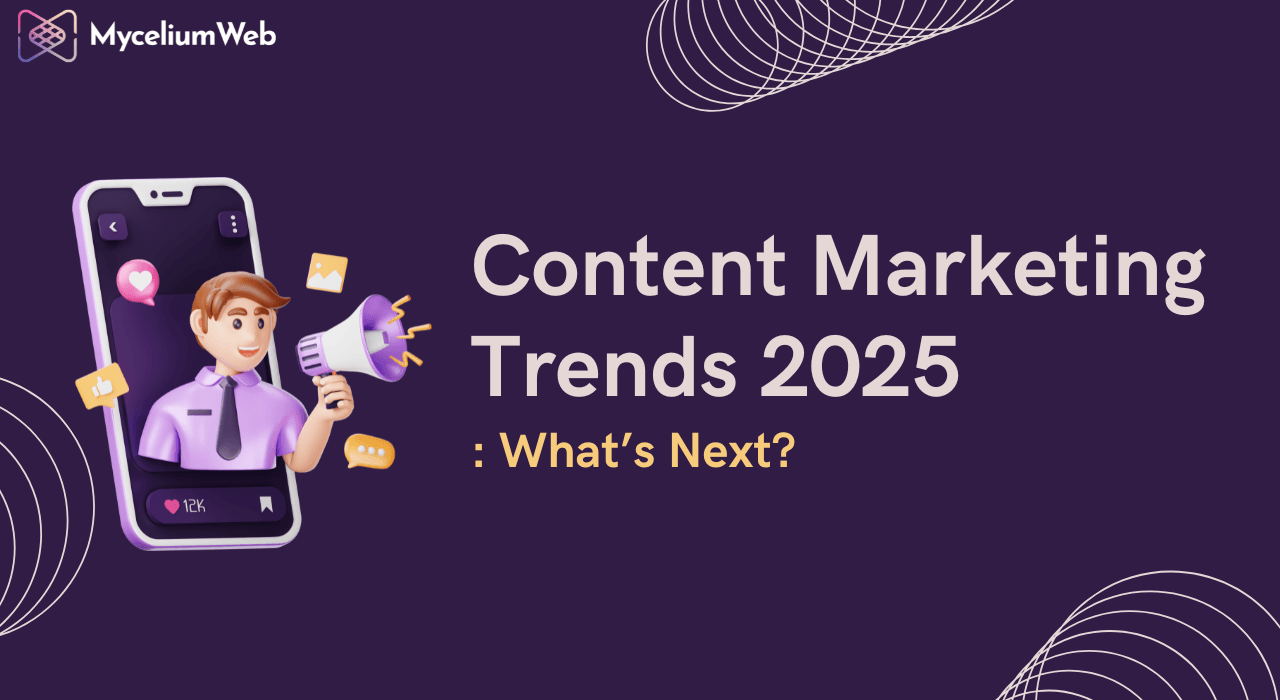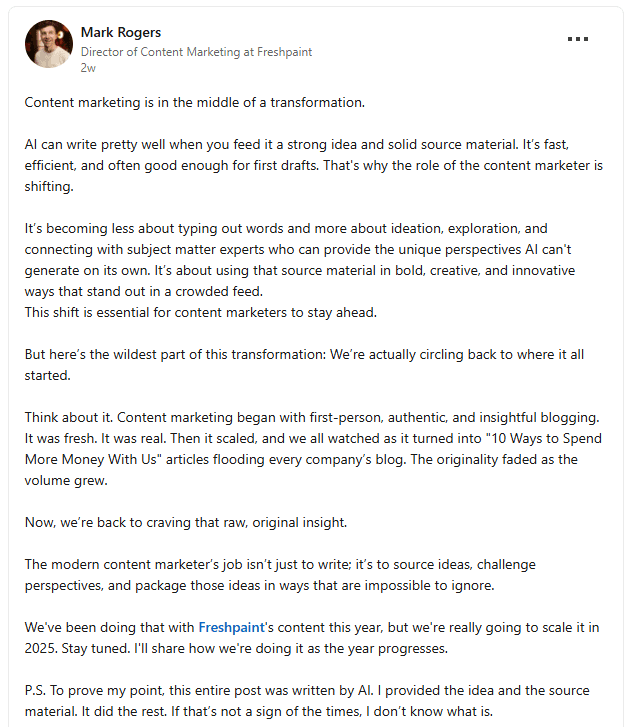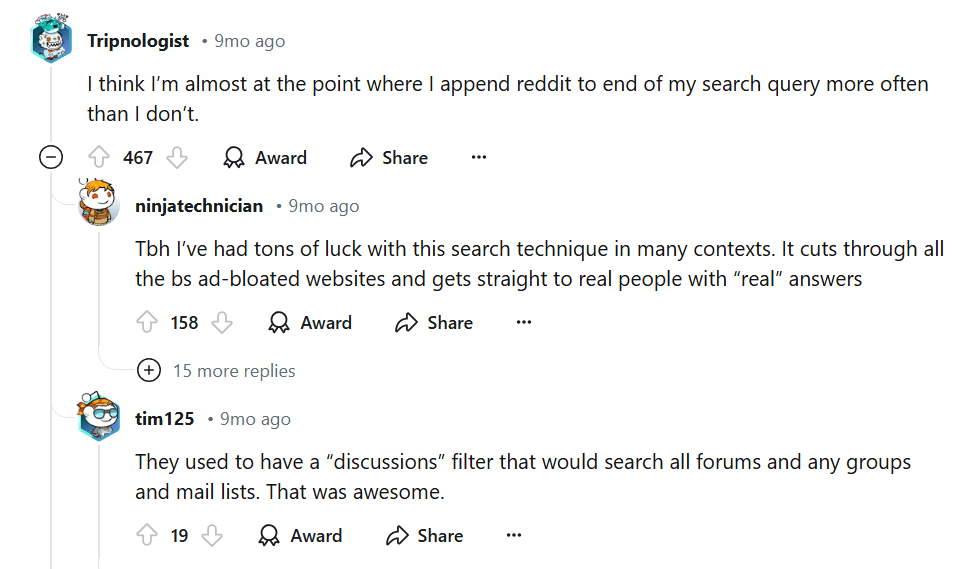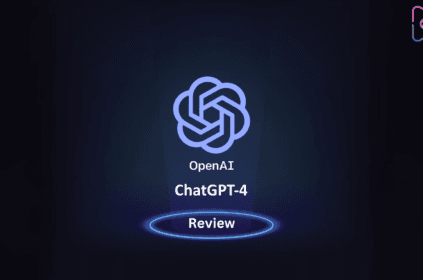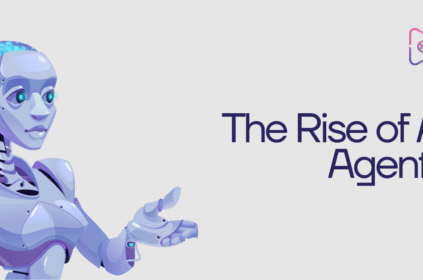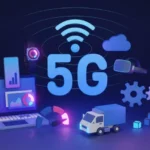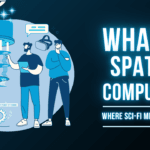“Marketing is no longer about the stuff that you make, but about the stories you tell.” – Seth Godin
If 2024 was a year of explosive growth in content marketing, 2025 is shaping up to be the year we navigate the new landscape with intention and strategy. The rapid adoption of AI, the rise of answer engines, and shifts in consumer expectations have created a new paradigm for marketers. The dust is settling on the seismic changes of the past year, and now it’s time to focus on what lies ahead.
This year, marketers will need to refine their approaches to maintain relevance and capture audience attention. The emphasis will shift from quantity to quality, as brands compete on originality, innovation, and trust. From leveraging advanced AI tools to mastering answer engine optimization (AEO) and rethinking distribution methods, content marketing in 2025 demands agility and foresight.
Here are the seven top content marketing trends for 2025, along with actionable strategies to help you prepare and thrive in the evolving digital space.
1. Marketers Will Build Uniqueness Moats Around Content
The era of “just another blog post” is over. In a digital landscape teeming with content, marketers are realizing that standing out requires more than just meeting SEO criteria or churning out high volumes of material. Instead, the focus is shifting toward creating unique, high-value content that resonates deeply with audiences. This trend, dubbed “building uniqueness moats,” is a response to the oversaturation caused by AI-driven content in 2024.
Why is this important? The mass production of AI-generated content has made it clear that quantity alone cannot guarantee success. Consumers and search engines alike are favoring content that offers something distinctive—be it proprietary data, expert opinions, or engaging storytelling. Novelty and depth are becoming the hallmarks of successful content marketing.
How to Prepare:
- Leverage Proprietary Data: Dive into internal analytics, user behavior studies, and product experiments to uncover unique insights that your competitors can’t replicate.
- Prioritize Storytelling: Infuse your content with real-world examples, customer success stories, and relatable narratives to make it memorable and impactful.
- Use AI to Enhance Originality: Instead of relying on AI to create generic posts, use it to analyze trends, extract ideas from long-form content, or repurpose your original insights into various formats.
By focusing on creating irreplaceable content, you’ll not only capture audience attention but also establish a lasting competitive edge that AI-generated material cannot easily replicate.
2. AI Technology Stacks Will Expand Exponentially
Artificial intelligence has revolutionized content marketing, but 2025 will see this trend take a new direction. Instead of relying on one or two multifunctional platforms, marketers are now building robust AI technology stacks with specialized tools tailored to specific needs. This shift is unlocking new levels of creativity and efficiency, enabling brands to scale their efforts without compromising quality.
Why does this matter? AI is no longer limited to text generation. From creating visuals and transcribing webinars to managing influencer campaigns, AI-powered tools now address virtually every aspect of content marketing. This level of specialization not only streamlines workflows but also allows marketers to explore new formats, such as podcasts, video series, and interactive infographics.
How to Prepare:
- Audit Your Workflows: Identify repetitive tasks or untapped opportunities (e.g., podcast production or advanced analytics) that could benefit from AI tools.
- Experiment with Niche Platforms: Explore tools like Design.ai for visual content, Eddie AI for video editing, or ElevenLabs for professional-quality voiceovers.
- Stay Updated: Regularly review emerging AI solutions and integrate them into your workflows to maintain a competitive edge.
With the right AI stack, you can achieve a balance between efficiency and creativity, enabling your team to focus on strategic initiatives while automating routine tasks.
3. Answer Engine Optimization (AEO) Becomes Critical
The way people search for information online is changing, and content marketers need to keep up. As answer engines like Perplexity and ChatGPT Search gain popularity, optimizing for these platforms—known as Answer Engine Optimization (AEO)—is becoming a crucial skill for marketers. AEO focuses on structuring content to appear prominently in AI-generated answers, much like optimizing for featured snippets in traditional search engines.
Why is this trend significant? Answer engines offer concise, direct responses to user queries, often pulling information from multiple sources. Unlike early iterations, modern answer engines now provide more robust citations, giving brands opportunities to build visibility and credibility. As more users turn to these tools for quick answers, content that ranks high in AI responses will enjoy a significant competitive advantage.
How to Prepare:
- Include Concise Answers: Structure your content with clear, well-written answers to common questions to increase the likelihood of being featured in AI responses.
- Use Conversational Language: Write in a natural, conversational tone to align with the way AI engines process and display information.
- Enhance Credibility: Add trust signals, such as author credentials, citations, and schema markup, to boost your content’s authority.
The migration to answer engines is already underway, and brands that invest in AEO now will be well-positioned to capture new audiences in the coming year.
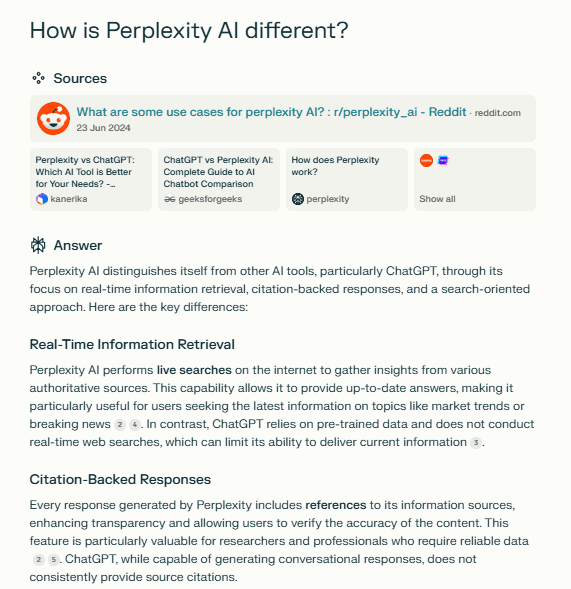
4. The Rise of AI Transparency
Transparency around AI-generated content is emerging as a key factor in building trust with audiences. In 2025, both consumer demand and regulatory pressure are pushing brands toward greater disclosure of their AI practices. While most consumers are not opposed to AI-generated content, they want to know when it has been used—and they expect brands to be upfront about it.
Why is this trend important? Surveys indicate that over 70% of consumers want AI usage disclosed, and government actions, like the White House’s recent executive order on synthetic content labeling, are adding to the momentum. Beyond compliance, transparency fosters trust, which is crucial in a crowded digital marketplace.
How to Prepare:
- Develop Internal Guidelines: Create a clear policy on what qualifies as AI-generated content and when it needs to be disclosed.
- Label AI Content Thoughtfully: Use disclaimers, watermarks, or other indicators to inform your audience without detracting from the content’s value.
- Stay Informed: Keep up with evolving regulations and industry best practices to ensure your transparency efforts remain compliant.
Embracing AI transparency is not just about meeting legal requirements—it’s an opportunity to position your brand as ethical, trustworthy, and forward-thinking.
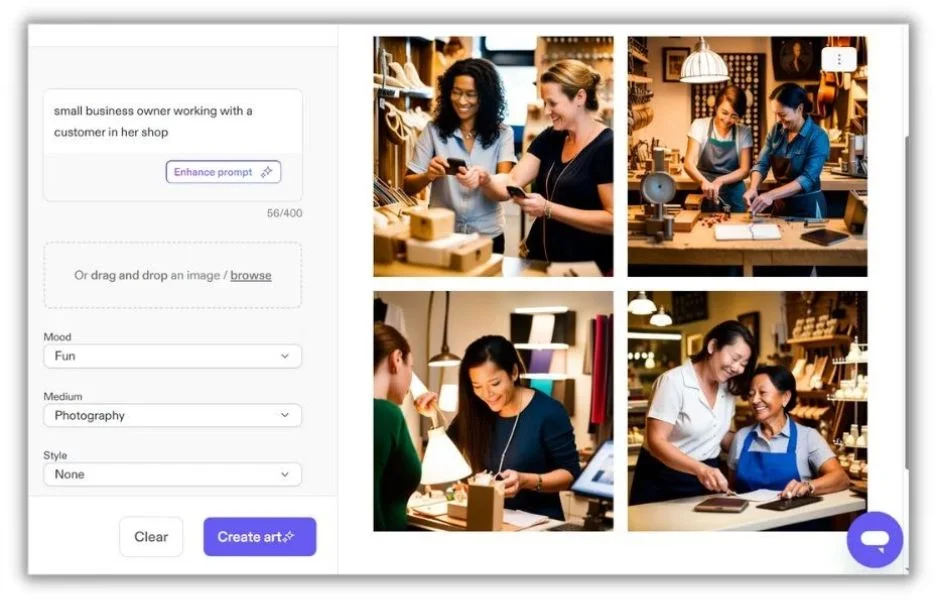
5. Forums Take Center Stage
Online forums are experiencing a renaissance as trusted spaces for authentic conversations and brand discovery. Platforms like Reddit, which saw a surge in visibility following Google’s 2024 core updates, are becoming increasingly important for content marketers. These digital gathering places offer a unique opportunity to engage directly with niche audiences.
Why is this trend gaining traction? Consumers are craving authenticity, and forums deliver unfiltered, real-world perspectives. Additionally, Google’s updated algorithms now favor forum content, pushing it higher in search results. This combination makes forums an invaluable tool for building brand credibility and reaching new customers.
How to Prepare:
- Research Audience Habits: Identify which forums your target audience frequents and what topics they discuss.
- Engage Without Selling: Focus on contributing value through helpful answers and relevant insights rather than overt promotions.
- Experiment with Ads: Test targeted advertising on platforms like Reddit to amplify your reach while maintaining authenticity.
Forums represent a unique blend of community-driven interaction and marketing potential. Approached correctly, they can become a powerful channel for growth.
6. The Call for Distribution Diversity Increases
Content distribution strategies are evolving, and diversification is now a necessity. The turbulence of 2024, marked by Google’s core updates and algorithm changes, highlighted the risks of relying too heavily on a single platform. In 2025, successful content marketers will prioritize reaching audiences across multiple channels.
Why is this critical? Google remains a major source of organic traffic, but its volatility has underscored the importance of not putting all your eggs in one basket. Diversifying your distribution not only mitigates risk but also ensures your content reaches a wider, more engaged audience.
How to Prepare:
- Repurpose Content Creatively: Transform blog posts into videos, podcasts, infographics, and social media snippets to extend their reach.
- Leverage Influencers: Build relationships with both internal and external influencers who can share your content with their networks.
- Explore New Platforms: Experiment with emerging channels like community-driven platforms, newsletters, and interactive media.
A diverse distribution strategy ensures that your content remains visible and impactful, regardless of changes in the digital landscape.
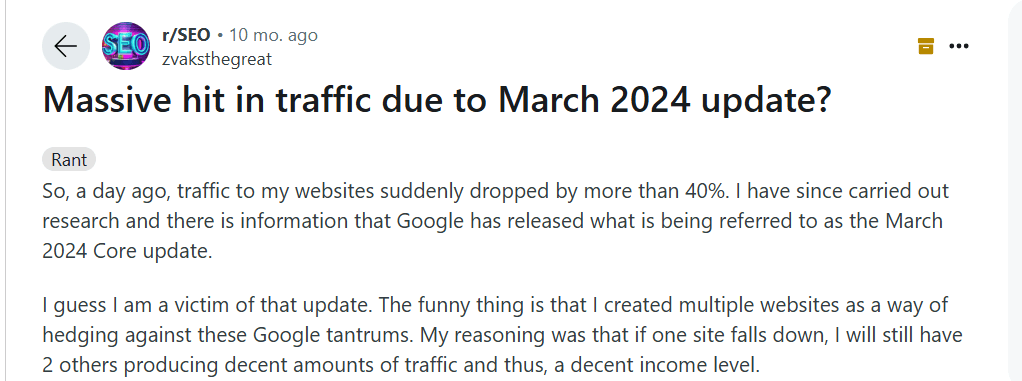
7. AI Education Becomes Mission-Critical
While AI adoption is widespread, many marketers still struggle to fully leverage its potential. In 2025, bridging the knowledge gap will be critical for teams and individuals alike. Brands that invest in AI education will position themselves as industry leaders, while those that don’t risk falling behind.
Why is this trend important? The rapid evolution of AI tools has created a steep learning curve for many marketers. Despite widespread adoption, surveys show that over 40% of professionals feel they lack the skills to maximize AI’s value in their roles. Addressing this gap is essential to staying competitive.
How to Prepare:
- Create Formal Training Programs: Implement structured AI education initiatives for your team to ensure consistent knowledge and skill development.
- Encourage Experimentation: Dedicate time for employees to test new tools, share findings, and iterate on workflows.
- Stay Engaged with Industry Leaders: Follow AI thought leaders and participate in online communities to stay updated on best practices.
AI education isn’t just a necessity—it’s an opportunity to foster innovation and drive growth within your organization.
The Road Ahead for Content Marketing in 2025
Content marketing in 2025 is entering a transformative phase. As AI technology matures, answer engines gain prominence, and consumer expectations shift, marketers must adapt to new challenges and opportunities. The brands that focus on originality, transparency, and diversification will not only survive but thrive in this evolving landscape.
At MyceliumWeb, we understand the complexities of modern content marketing. From crafting unique, high-impact content to optimizing for emerging trends like AEO and forum engagement, we’re here to help you navigate the changes with confidence.
Ready to elevate your content marketing strategy? Contact us today to learn how MyceliumWeb can empower your brand to succeed in 2025 and beyond.
